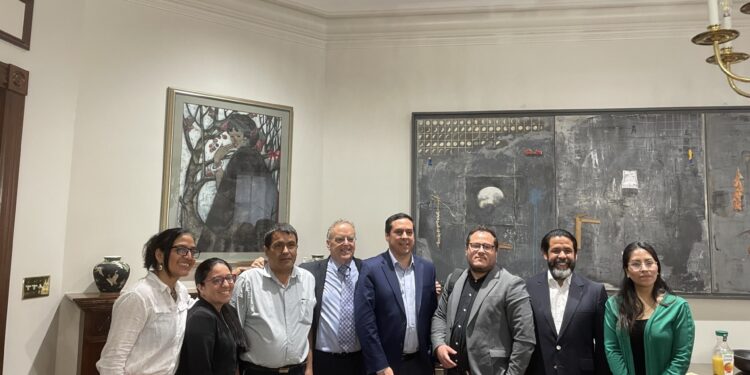On August 29, a Peruvian delegation visiting the United States met with whistleblower attorney Stephen M. Kohn to learn about the role of whistleblowers in the fight against corruption. The delegation was part of the State Department’s International Visitor Leadership Program (IVLP). It included government officials dedicated to stopping corruption, civil society leaders involved in environmental protection, and journalists. Kohn was asked to speak with the group, given his expertise in transnational whistleblower law and role as Chairman of the Board of the National Whistleblower Center.
“There is an expression… a fish rots from the head,” said Kohn, addressing the deeply rooted fear of whistleblowing in Peru. “If you’re going to fight corruption, you really have to go to higher levels.”
Kohn explained the broad transnational application of four U.S. laws to the IVLP delegation. These laws, which protect the confidentiality of whistleblowers and provide them with 10-30% of the sanctions collected, have already been used successfully by Peruvians.
“I would recommend a dual strategy,” said Kohn, “domestic legislation is the long-term fight, but you can use transnational U.S. whistleblower laws immediately.”
The U.S. government sanctioned companies in four multi-million the Foreign Corrupt Practices Act (FCPA) cases involving bribery or market manipulation in Peru. The biggest Peruvian FCPA case implicated Brazilian construction conglomerate Oldebrecht and Braskem in a bribery scheme. The U.S. sanctioned the company $3.5 Billion – representing the largest FCPA sanction at the time (2016).
According to the Securities and Exchange Commission (SEC), at least 13 Peruvian whistleblowers have joined the rank of the over 5,000 international whistleblowers to use the Dodd-Frank Act to report a violation of U.S. securities laws.
A new Anti-Money Laundering Act Whistleblower Program was passed at the end of 2022. So far, no data has been collected on its usage. However, according to Kohn, this will become one of the biggest assets to whistleblowers looking to report bribery. Under this law, banks who fail to report suspicious activity – particularly by public officials – can be sanctioned.
The Commodity Exchange Act is the last, but certainly not least, of what Kohn called the “Big Four” transnational laws. It gives the U.S. jurisdiction over money laundering and bribery in commodities markets, including in the mining and timber trade – industries particularly relevant to Peru.
The IVLP participants expressed their eagerness to spread awareness about these programs. They conferred that they are not being used to the extent that they can be by Peruvians.
The delegation also reviewed the OECD audit of Peru Phase II Report on Peru’s implementation of the Anti-Bribery Convention, which recommends that Peru “take appropriate measures to protect from discriminatory or disciplinary action for public and private sector employees who report to the competent authorities suspected acts of foreign bribery.”
According to one participant, the bigger challenge is not necessarily passing laws that protect whistleblowers in writing but proving to whistleblowers that they can trust the law.
“How do you address distrust of the government,” he asked.
Kohn responded, “The day [the U.S. government] made the first payment [to a whistleblower] was the day people realized that maybe the government was on [the whistleblowers’] side and would treat [whistleblowers] as the law required.”




